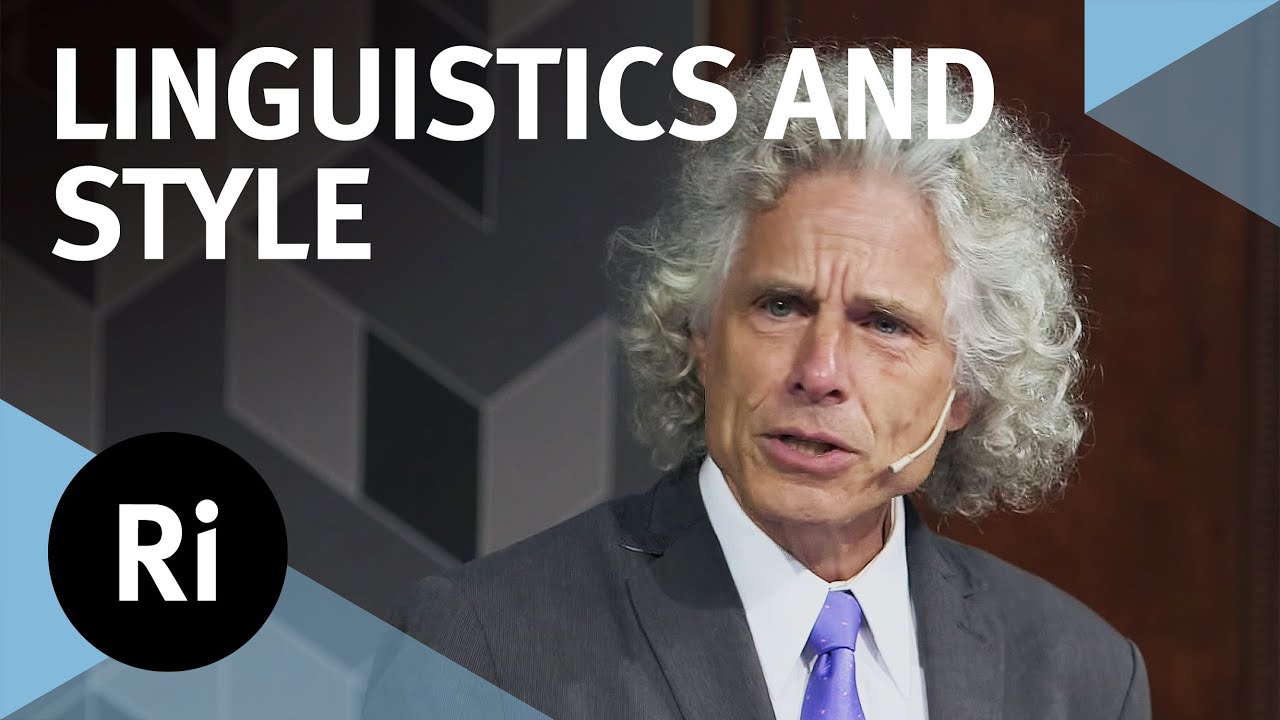The Royal Institution
Does writing well matter in an age of instant communication? Drawing on the latest research in linguistics and cognitive science, Steven Pinker replaces the recycled dogma of style guides with reason and evidence.
Subscribe for regular science videos: http://bit.ly/RiSubscRibe
Watch the Q&A here: https://www.youtube.com/watch?v=7rYAnYXIhL0
In this brand-new talk, introduced by Lord Melvyn Bragg, Steven argues that style still matters: in communicating effectively, in enhancing the spread of ideas, in earning a reader’s trust and, not least, in adding beauty to the world.
Steven Pinker is an experimental psychologist and one of the world’s foremost writers on language, mind, and human nature. He is Professor in the Department of Psychology at Harvard University and conducts research on language and cognition but also writes for publications such as the New York Times, Time, and is the author of many books, including The Language Instinct and How the Mind Works.
Melvyn Bragg is a broadcaster, writer and novelist. He was made a Life Peer (Lord Bragg of Wigton) in 1998. Since then he has hosted over 660 episodes of In Our Time on subjects ranging from Quantum Gravity to Truth. He was presenter of the BBC radio series The Routes of English, a history of the English language. He is currently Chancellor of the University of Leeds
Subscribe for regular science videos: http://bit.ly/RiSubscRibe
The Ri is on Twitter: http://twitter.com/ri_science
and Facebook: http://www.facebook.com/royalinstitution
and Tumblr: http://ri-science.tumblr.com/
Our editorial policy: http://www.rigb.org/home/editorial-policy
Subscribe for the latest science videos: http://bit.ly/RiNewsletter
Source




Thanks to some linguistically gifted fans, we now have English and Spanish subtitles for this video. Many thanks and gracias!
He sounds like the narrator on Fractured Fairy Tales.
It's great that merely putting up a picture of George W. Bush elicits laughter from the audience.
I like my writing style the way I like my universities:
Free of Postmodernism
“There is nothing sinister about driving on the left”…
My meme senses were tickling when I clicked on this video
i thumbd up this video before i watched it , because i know steven Pinker is the MAN and the R. I . strait kicks some ASS!
smuuuuug
Note to self: Next time you are ready to edit your writing, review the summary at 52:58
Captivating talk, amazing hair! 🙂
Having a sweet laugh at the number of converters required to get the Apple to output video.
this might be a generational thing, but I find it much easier to communicate through writing than speaking- when I speak, I tend to sound like a babbling mess but I can write clear essays pretty consistently
I guess we put up with it because the alternative, dumbing EVERYTHING down, is too painful a scenario to contemplate.
Awesome presentation, help the reader picture the action.
"There's nothing sinister about driving on the left, nothing gauche or socialist"
I think I weed a little bit
I really wanted watch this video, but the icrap computer turned me away…
Will everyone stop with these annoying introductions?
I understand that the lecturer is a frequent public speaker and legit scientist, who prepared in advance and whose material has been built word by word over the years. However, even with that in mind, I felt so captivated by the way he presented his ideas that I felt very inadequate. Not only did it look profound, coherent and incredibly eloquent, but it also drew the audience’s attention with fun familiar scenarios. I guarantee that every person, who witnessed the presentation, envied Mr. Pinker: his knowledge, skills and most importantly his life choices and values – none of which were mentioned, but all of which were yet so apparent.
Museums are teeming with fine arts of sculpture and paintings and relics, but this speech is the finest art of all.
I would like to thank you, The Royal Institution of London, as well as Mr. Pinker – I no longer want to be entertained. None of the Hollywood stars shine brighter than the armor of light you wear. This light is now my beacon. I’m on my path to forge my own.
Each time Steven Pinker said 'she' I realized a bit more how much I use 'he' instead of 'they' or 'she' and imagine my reader to be male. Time for some introspection..Thanks for the great lecture!
51:10 "None of the dictionaries say…" =D ~ just teasing. I love this lecture.
He said, around 44:00, "… I'm the chair of the Usage Panel of the American Heritage Dictionary". So, Steven Pinker is a chair?
Gotcha!
This is a fantastic lecture, but I disagree with Professor Pinker in many of his assessments.
Actually, fulsome has two meanings, one "of large size or quantity; generous or abundant." (Oxford Dictionary) So no Mr. Pinker, it's not incorrect to give fulsome praise. And the level of confidence you had when you explained why it was wrong. The level of confidence for this entire talk. Sorry, this was a superficial fly-through of a very complicated area.
Awesome!
So brilliant!
I want to know where he got his hair style.
If you do wish generally to avoid splitting infinitives, for clarity do so by placing the adverb as near as practicable to the word it modifies. (self-referential example)
Great great great content
This has been a joy to watch. I am thoroughly amused!
A really bad trend in modern writing is the tendency to turn sentences into algebraic formulas, e.g., "The dude (who had the big white beard) met with (and hooked up with) the dame (with the lamb's wool coat – not the one with the leather coat) – becoming mutually self-important (meaning snobs (= stuck-up assholes)).
The worst trends in modern writing come from Wikipedia.
First, they refuse to show respect to physical laws by capitalizing their names, e.g., "Einstein's special theory of relativity" instead of "Einstein's Special Theory of Relativity".
Second, they love to introduce extraneous commas everywhere they can, just check any article and see how long until you stub your toe. "In 1912, the cat ate a canary" instead of "In 1912 the cat ate a canary"."The arsenal at Dum-Dum, in present-day north Kolkata" instead of "The arsenal at Dum-Dum in present-day north Kolkata". "Abe Lincoln, the Civil War President wore a beard, and Mary Todd Lincoln, his wife, was a fashion plate" instead of "Civil War President Abe Lincoln wore a beard and his wife Mary Todd Lincoln was a fashion plate.."
Third, too many capital "The"s. For example "The Civil War President Abe Lincoln wore a beard." "The Austrian physicist Albert Einstein ate a bad sardine" instead of "Austrian physicist Albert Einstein ate a bad sardine."
I will take the liberty to add six more style suggestions:
— Do not use abbreviated texting talk, U Idt.
— Do not use OMG unless you on friendly terms with God.
— Reference some other source than Wikipedia
.
— Serve me, stupid. I bought your book, and I want an ROI
.
— "F" is not an adjective, nor is any other profanity, unless your have an IQ of 20
.
— Give me a parable. Jesus started a movement that went right around the world, and he ALWAYS told stories to his followers to illustrate truth.
— "Broadly speaking, the short words are the best, and the old short words best of all." Winston Churchill
I know, that is seven instead of six. And eight is…..
— When you stretch the blanket, admit it. Never use lies to teach the truth.
This sample of story telling is free and found on my online journal: http://www.blessedquietness.com/yarn/Up-the-the-hill-behind-kijabe-and-rva.htm
whts wrong with the sentense :checking into the hotel,it was nice to see …..
What about understanding language into the future in themes such as user manuals in matters such as radioactive waste disposal facilities in say 500years from now or even more….
Correct language use certainly is flexible however correct use is more than just tacit agreement, there are certain syntactic elements that a language needs for clear semantics. Early computer science departments recruited heavily from linguistics departments when developing the first high level programming languages for this syntax aspect, tacit agreement between the program writer and the compiler is assumed. The most notable aspect for me is the use of "regular expressions" for parsing both computer and human language texts. (Both the theory and application of regular expressions are deep rabbit holes that I don't dare explain here.)
2:51 the quote "recent graduates, including those with university degrees, seem to have no mastery of the language at all."
which graduates exactly don't have university degrees? seems that man didn't have the mastery he decries others for lacking
pinkerton suggests that if physics is real then non phyisicists can understand it. what?
WRONG. Simple question: how many sets of american children are there? Only one? Oh.So our american children=1 which for some of the less educated among us means singular tense.
I'm weary of the description of descriptivism (lol) here. Descriptivsts describe what is considered grammatical and what is considered ungrammatical in a language by the community who speaks it ("grammatical" meaning here that the sentence is understandable and sounds natural to a native speaker's ear, not that it follows a set of arbitrary rules like how the prescriptivists would use the word); in other words descriptivists describe what makes and doesn't make sense, or what doesn't cause and what causes a dissonance in the listener's head (or, to put it your way, what follows and what doesn't follow the tacit rules). Of course, it also means they look at the speech of native speakers (preferably not children, especially for more complex sentences), because they are the ones who internalized the language the best.
So of course descriptivists acknowledge that "I can has cheeseburger" is ungrammatical; no native speaker would normally phrase this sentence that way under normal circumstances. Sure, we do say there's nothing inherently wrong with it (after all, it's still understandable), but descriptivism is about describing, so of course we include in the description what is and what isn't deemed acceptable by the community of speakers in X situation, what sounds very unnatural for native speakers even if it's understandable, and so on.
So, yeah, your stance is pretty much descriptivism (and so is the dictionaries', from what I see).
Now, that said, there can be branches of descriptivism; for instance, there are some who think we should always respect the social norms around language (for instance, that it's okay to say "gonna" to a friend, but it's not okay to write it in an academic paper), while others think those norms are to be challenged. I will admit I'm from the latter, but I still try my best to respect the norms. I just won't judge someone who doesn't; I might warn them that they might be judged by others, but no more than that. Still, that doesn't mean I will accept ungrammatical sentences, the ones that no native speakers would create in normal circumstances, so "I can has hamburger" is still out of question.
In short, if there are people who say "I can has cheeseburger" is 100% fine, then call them "language libertarians" or something, but this is not what descriptivism is about.
Otherwise, the conference is great.
24:45 Orwell's Politics and the English Language is from 1946, not 1949
The indoor generator warning is a great anecdote, but fuck that's tragic!
Steven Pinker is making up his anthropology to better fit with his worldview presented in his books. He must be one of the most dishonest scholars we have today. He pretends violence has drastically declined since the stone age, and that society has humbled us, but all his examples are from agricultural societies, and he has the worst examples. If you go to him for reference you are going to Pop CULTURAL Science. Ofc It's popular because it legitimizes our society. It's so bogus
Can I get this is a top 10 list please? Maybe a top 3?
Blah, blah, puke.
33:50 will take out all the spice from a nice space adventure fiction! It is the unknown, unsaid, unexplained that fires my imagination!
.ppt design is also an act of craftsmanship.
There's a whole nother world of language out there.
I will never get used to nother
What those grammar Nazis don't realize is that language is not science. language is fluid, dumb, irrational and full of legacy bs – an intimate extension of humans and it's anything but sciencey. yeah, you document language, but don't force/shape it – that's collective job of the speakers. let the people drive the language, not some self-absorbed 'professors', according to their own taste. Use the language, get stuff done with it – don't waste time on its fetishisation and glorification.
Very good lecture. Bravo!
One of the most charismatic and sofisticated people I have seen so far. Great lecture.